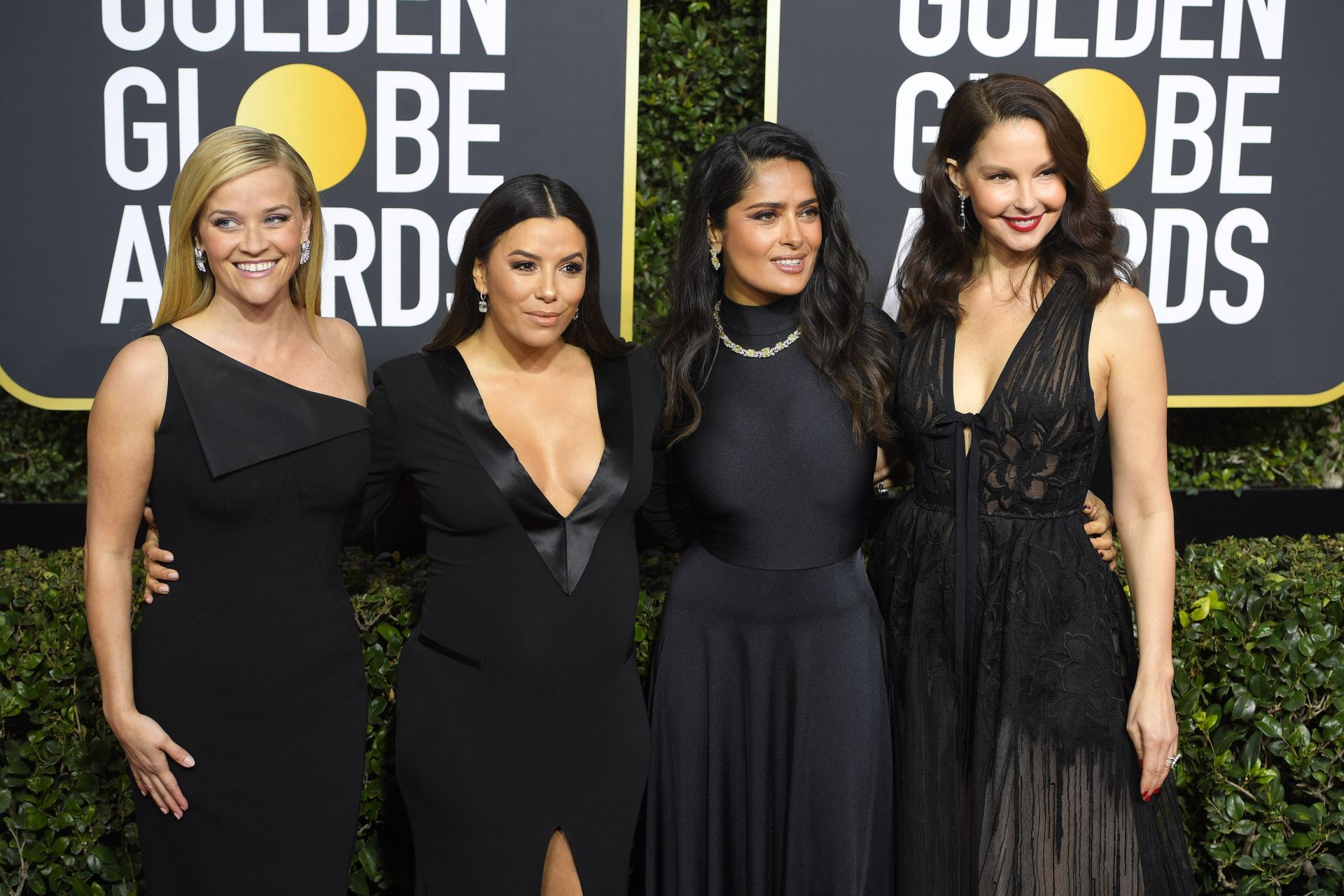
Actresses Reese Witherspoon, Eva Longoria, Selma Hayek and Ashley Judd pose for a photo at the 75th Annual Golden Globe Awards during the red carpet arrivals at The Beverly Hilton Hotel. Credit: Courtesy of TNS
The #MeToo and Time’s Up movements have impacted more people than just those dressed in black on the Golden Globes red carpet. But to Ohio State instructor Cynthia Burack, that evening might not be as influential as it seems.
“These campaigns that we’re seeing right now are really important, they’re socially important, they’re important educationally, they may be important in terms of policies, for example companies might put into effect and try to make work for victims of sexual harassment,” said Burack, a professor of political theory in the Department of Women’s, Gender and Sexuality Studies at Ohio State. “But many women are in a very different position than the kinds of people we saw come out at the Globes.”
She said the activism displayed in the recent women’s empowerment movements are necessary but not sufficient because the people who often experience sexual assault and misconduct are in positions where they would be fired if they spoke up.
“It’s not a problem that’s going to be solved by the kinds of campaigns we’re seeing now. They can lead to better solutions in the future,” Burack said.
Burack said movements similar to #MeToo and Time’s Up have happened in the past, but have not endured, something that makes her think the current push against sexual assault and misconduct might not stick around.
For example, in 1991 Anita Hill brought sexual harassment allegations against then-nominee for Supreme Court, and her former colleague, Clarence Thomas. Regardless of the allegation he was confirmed for the position which sparked outrage across the country and heightened national awareness on workplace harassment.
“Each time we tend to think this is the one that will ‘take’ and change people’s perceptions and behavior,” she said.
Today, Thomas remains active in his role as Supreme Court judge.
The activism in Hollywood began in the fall when actress Alyssa Milano encouraged women who have experienced sexual assault or harassment to tweet the phrase “me too” on Twitter. The words quickly became a hashtag and went viral.
Time’s Up, the initiative that united celebrities at the Golden Globes and spurred attendees to wear black clothing and black-and-white pins in solidarity, was formed Jan. 1 by a group of women in the film industry, including Reese Witherspoon and Kerry Washington, as a “unified call for change from women in entertainment for women everywhere,” according to its website.
Sara Wendel, the president of Advocates for Women of the World, an organization that works to raise awareness of women’s issues at Ohio State, said she’s anticipating seeing the activism’s effects on campus.
“It’s empowering to see an issue too often seen on college campuses discussed by people of all ages, sexes, and genders, and professions,” Wendel said. “I hope that the conversation will only expand and continue until everyone understands what constitutes sexual harassment and assault and that both are wrong.”
She said women at Ohio State can follow the momentum the celebrities on the red carpet and supporters on Twitter show, adding that it could open the door for other similar campaigns to arise.
There also is potential comfort in witnessing celebrities represent a women’s movement, she said, adding that victims of sexual assault and harassment can look to the movement and see others who have experienced similar hardships.
“People are really starting to pay attention and do something about it,” Wendel said. “There is still much to do to keep the momentum going and create change.”
In the 2017 Ohio State campus climate survey, one in five female respondents reported being victim to some form of nonconsensual sexual intercourse.
“An overwhelming number of undergraduate women are impacted by sexual assault, as a victim or survivor or the friend of one,” Wendel said.
Burack said the current movements will not create a world without sexual assault, but they could change the magnitude to which it is experienced.
“The goal is just to do a lot better than we’re doing now, and to do that on many different fronts,” she said. “We can do a lot better to protect people before those harms occur and we can also do a lot better at making people feel whole after the fact.”


